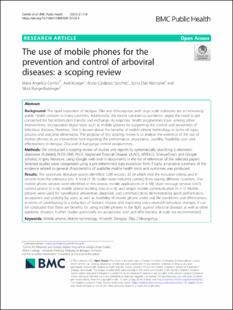The use of mobile phones for the prevention and control of arboviral diseases: a scoping review
...
Carrillo, Maria Angelica | 2021-01-09
Background: The rapid expansion of dengue, Zika and chikungunya with large scale outbreaks are an increasing
public health concern in many countries. Additionally, the recent coronavirus pandemic urged the need to get
connected for fast information transfer and exchange. As response, health programmes have -among other
interventions- incorporated digital tools such as mobile phones for supporting the control and prevention of
infectious diseases. However, little is known about the benefits of mobile phone technology in terms of input,
process and outcome dimensions. The purpose of this scoping review is to analyse the evidence of the use of
mobile phones as an intervention tool regarding the performance, acceptance, usability, feasibility, cost and
effectiveness in dengue, Zika and chikungunya control programmes.
Methods: We conducted a scoping review of studies and reports by systematically searching: i) electronic
databases (PubMed, PLOS ONE, PLOS Neglected Tropical Disease, LILACS, WHOLIS, ScienceDirect and Google
scholar), ii) grey literature, using Google web and iii) documents in the list of references of the selected papers.
Selected studies were categorized using a pre-determined data extraction form. Finally, a narrative summary of the
evidence related to general characteristics of available mobile health tools and outcomes was produced.
Results: The systematic literature search identified 1289 records, 32 of which met the inclusion criteria and 4
records from the reference lists. A total of 36 studies were included coming from twenty different countries. Five
mobile phone services were identified in this review: mobile applications (n = 18), short message services (n=7),
camera phone (n = 6), mobile phone tracking data (n = 4), and simple mobile communication (n = 1). Mobile
phones were used for surveillance, prevention, diagnosis, and communication demonstrating good performance,
acceptance and usability by users, as well as feasibility of mobile phone under real life conditions and effectiveness in terms of contributing to a reduction of vectors/ disease and improving users-oriented behaviour changes. It can be concluded that there are benefits for using mobile phones in the fight against arboviral diseases as well as other epidemic diseases. Further studies particularly on acceptance, cost and effectiveness at scale are recommended.
LEER











